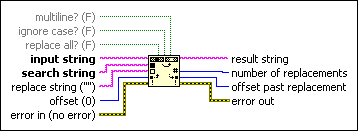 |
multiline? specifies whether to treat the text in input string as a multiple-line string. This setting affects how the ^ and $ characters handle matches. If you set multiline? to FALSE (default), when you enter ^ at the beginning of a regular expression, the expression matches only the beginning of the string in input string. When you enter $ at the end of a regular expression, the expression matches only the end of the string in input string. If you set multiline? to TRUE, ^ matches the beginning of any line in input string and $ matches the end of any line in input string.
 | Note The ^ character anchors the match to the beginning of a string when used as the first character of a pattern. If you add ^ to the beginning of a character class immediately after an open square bracket, the expression matches any character not in a given character class. |
|
 |
ignore case? specifies whether the string search is case sensitive. If FALSE (default), the string search is case sensitive.
|
 |
replace all? specifies whether the function replaces all occurrences of the search string or only the first occurrence. If FALSE (default), the function replaces only the first occurrence.
|
 |
input string specifies the input string you want the function to search.
|
 |
search string specifies the string you want to search for and replace. If search string is an empty string and replace all? is FALSE, the function inserts replace string at the beginning of input string. If search string is an empty string and replace all? is TRUE, the function inserts replace string at the beginning, in between each character, and at the end of input string.
To search using advanced regular expressions, right-click the function and select Regular Expression.
|
 |
replace string specifies the string you want to insert in place of search string. The default is an empty string.
To configure the Search and Replace String function to accept backreferences in replace string, right-click the function and select Regular Expression.
|
 |
offset determines the number of characters into input string at which the function starts searching for search string.
|
 |
error in describes error conditions that occur before this node runs. This input provides standard error in functionality.
|
 |
result string contains the input string with one or all occurrences of search string replaced with replace string. If replace string is empty, result string contains input string with search string deleted.
|
 |
number of replacements returns the number of times LabVIEW replaced search string.
|
 |
offset past replacement indicates the offset in result string of the character immediately following where the last match and replacement occurred. If replace all? is FALSE, the next match, if any, is after this point.
If the function does not find search string, offset past replacement returns –1.
|
 |
error out contains error information. This output provides standard error out functionality.
|
If you want to search for more complex patterns, such as patterns that contain character grouping, alternate pattern matching, backreferences, or non-greedy quantification, configure the function for advanced regular expression searches or use the Match Regular Expression function.
Regular expression support is provided by the PCRE library package. Refer to the <National Instruments>\_Legal Information directory for more information about the license under which the PCRE library package is redistributed.

 Add to the block diagram
Add to the block diagram Find on the palette
Find on the palette






